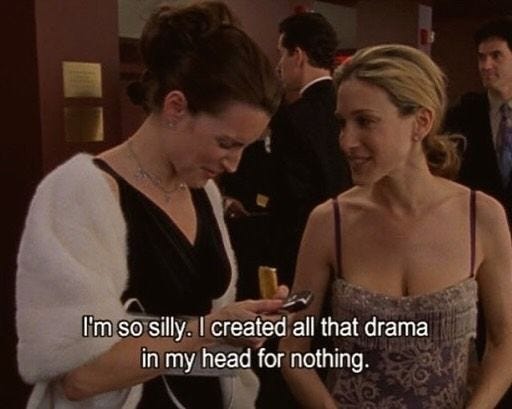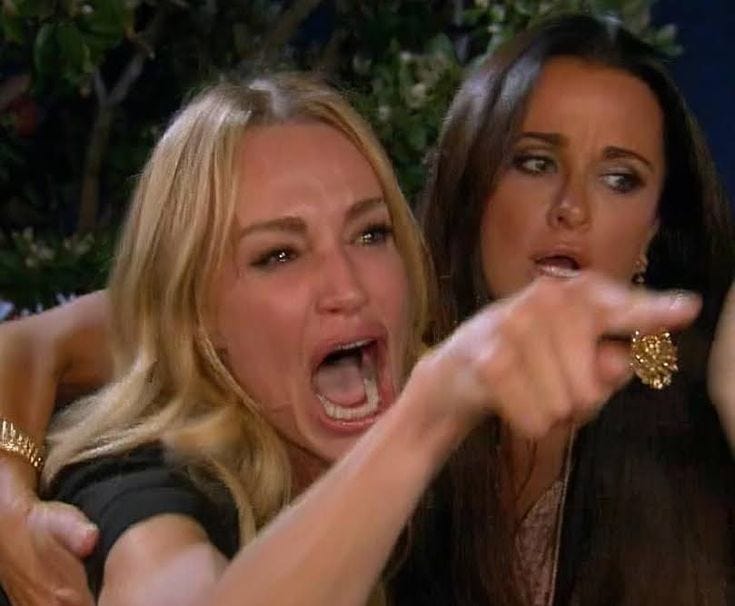Look, I’m not saying I’m a complete bitch, but I’m not going to take the idea entirely off the table either.
The first time I was ever called one, I was probably about ten. No prizes for guessing who said it: my older sister. Now, yes, she may have had her reasons, sibling rivalries are rarely pretty—but let’s be honest, there was definitely a touch of bias in her judgment. Still, even at that young age, it planted a seed. A kind of self-awareness, maybe. Or a warning. Either way, it stuck.
That moment wasn’t just about the name. It was my first real taste of confrontation, the sting of being called out, even if unfairly. And it taught me something important: confrontation can hurt, but it also demands attention. It shakes you out of comfort and forces you to ask questions. Am I really that? Did I do something to deserve it? Or is this just about her, not me? That one little insult made me realise early on that words have power, and confrontation—however fucking messy—can shift the dynamic of a relationship in an instant.
I’ll never understand why confrontation inherently has a bad rep, especially for women. The act of raising an issue is often considered problematic, and those who raise them are deemed aggressive, difficult, or ‘too much’. But here’s what I’ve learnt: when it’s done right, confrontation is one of the most powerful tools for growth, not just for others but for yourself.
Let’s say I’ve done something that’s hurt you. Maybe I didn’t realise. Maybe I did, and I just didn’t think it mattered at the time. But then you confront me…. calmly, honestly. That gives me the chance to reflect, to apologise, and to do better. It’s uncomfortable, sure. But it’s necessary. That’s how relationships strengthen. That’s how people evolve.
On the flip side, if I disagree with your confrontation, then it opens a door for conversation. I get to explain my side, clear up misunderstandings, and maybe shift your perspective too. It’s a two-way street. A recipe for growth, more often than not.
That said, I haven’t always been good at it. Especially not when my emotions are running high. I’ve walked into confrontations burning with anxiety or stress, already on edge, and it’s clouded my judgement. I’ve said things more harshly than I meant, pushed harder than I should’ve, and misread situations through a fog of fear or frustration. I’m not proud of those moments, but I own them. They’ve taught me the difference between reacting and responding. Between venting and actually communicating.
As a kid, I learned early on that unresolved issues have a way of poisoning everything around them. So, I made a silent vow to myself: don’t let things fester. Say what needs to be said. Keep communication honest, even when it’s hard. Especially when it’s hard.
In fact, I used to tell my friends, “Fear the day I stop confronting you. That’s when you’ll know I’ve let go”, though now I see how that sounds like a mild threat.
But here’s the truth—I only confront the people I care about. If I didn’t give a damn about you, I’d let it slide. I wouldn’t waste my energy. Silence, for me, is the death knell of a relationship. When something goes wrong and I say nothing, it means I’ve already started to walk away. I’m at peace with the idea of losing you, and no conversation can change that. Even if we fixed the issue, I just wouldn’t care anymore.
That’s the power of emotional investment. I fight to keep the people I love. But I also know when to stop.
Still, I sometimes wonder if I lean too heavily into confrontation. Maybe I do push too hard? Too often? I forget that some people weren’t raised to speak their truths so openly, and that my directness might feel like a storm they weren’t prepared for.
But I’d rather be honest than hold onto resentment. I’d rather risk discomfort than let bitterness take root. And yes, that makes me confrontational. But it also makes me real. And in a world full of people too afraid to say how they really feel, I’ll wear that label proudly.
So confront me. Please.
It means you still care.
And if I confront you, know that I still do, too.
xoxo







“I’ll never understand why confrontation inherently has a bad rep, especially for women. The act of raising an issue is often considered problematic, and those who raise them are deemed aggressive, difficult, or ‘too much’.”
I think you hit the nail on the head here - that we, women especially, have been taught from young not to be aggressive, difficult, or too much. And unlike you, it took me a long long time, way into adulthood really, to learn about the poison of unresolved issues.
But yes. Confrontation is a skill I’ve had to learn recently. A skill I’m still trying to master 😅
Thank you for sharing, I enjoyed reading this.
love this one sash! confrontation: communication: connection